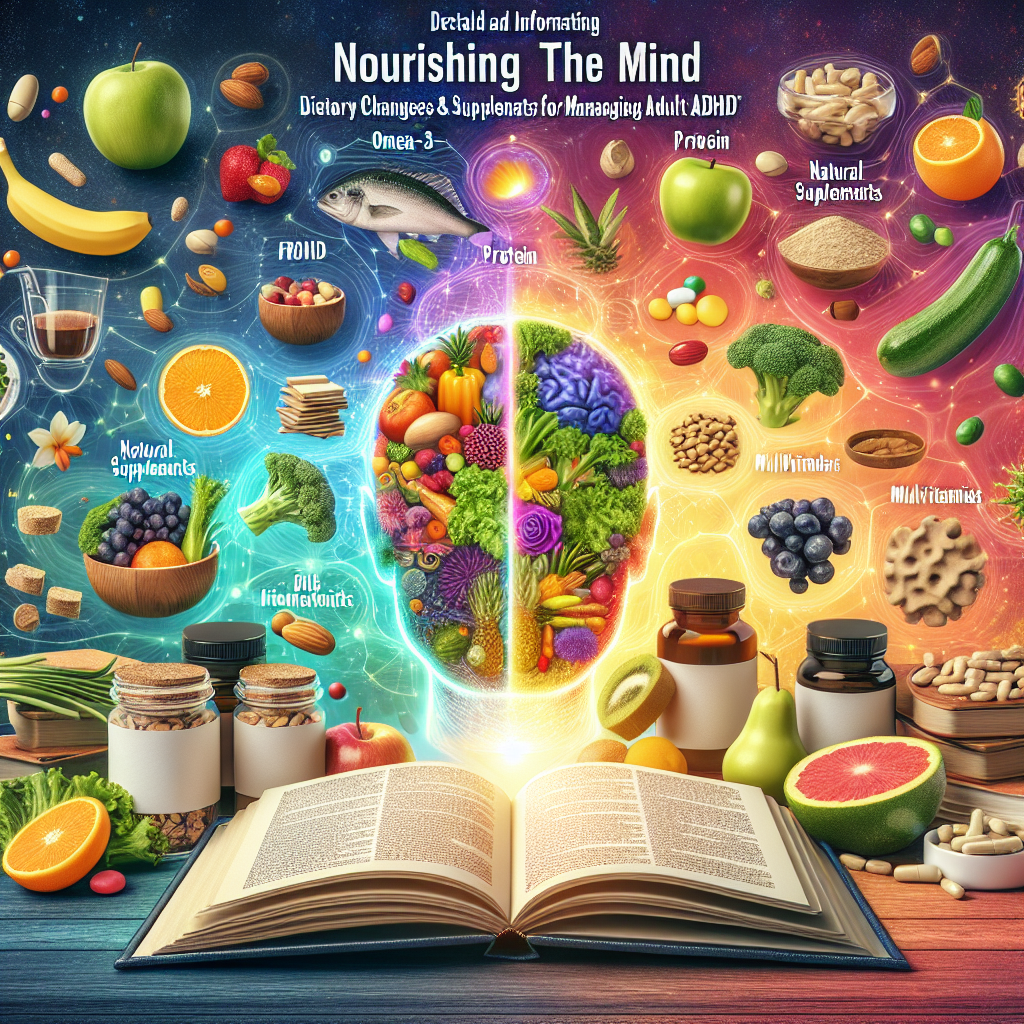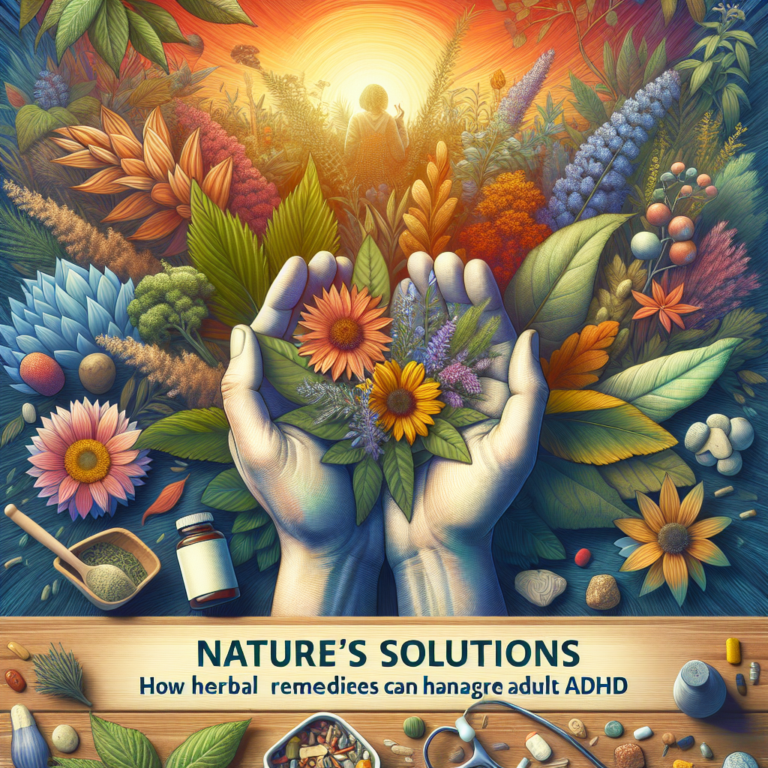
Nourish the Mind: Essential Dietary Changes and Natural Supplements for Managing Adult ADHD
Introduction
For many adults living with Attention Deficit Hyperactivity Disorder (ADHD), managing symptoms can feel like an uphill battle. The whirlwind of everyday life can result in disorganization, impulsiveness, and distractibility that affects work, relationships, and personal happiness. While medications have been the cornerstone of ADHD management for decades, a growing body of research points toward alternative strategies—specifically, dietary changes and natural supplements. In this article, we will explore how to Nourish the Mind: Dietary Changes and Natural Supplements for Managing Adult ADHD effectively, providing you with invaluable insights akin to the hidden treasures in the world of nutrition.
Understanding ADHD in Adults
Before diving into the dietary strategies and supplements, it’s essential to grasp what ADHD really entails. Unlike in childhood, where hyperactivity is more apparent, adult ADHD often manifests as inattention, poor time management, and emotional dysregulation. According to the American Psychiatric Association, about 4.4% of adults in the United States have ADHD. This significant prevalence emphasizes the importance of understanding and exploring diverse management strategies.
ADHD and Nutrition Connection
Nutrition plays a pivotal role in brain health, and emerging studies suggest that specific dietary patterns can positively influence ADHD symptoms. Research indicates that certain nutrients can affect neurotransmitter function, inflammation, and overall brain chemistry, potentially alleviating some of the struggles associated with adult ADHD.
The Role of Diet in Managing ADHD
Macronutrients: The Building Blocks of Brain Health
Understanding the role of macronutrients—proteins, fats, and carbohydrates—is crucial for anyone looking to nourish their mind.
Proteins
Proteins are vital for neurotransmitter synthesis. Amino acids, which make up proteins, are the precursors for neurotransmitters like dopamine and serotonin. Increasing the intake of protein-rich foods such as lean meats, fish, eggs, legumes, and nuts may help improve focus and sustain energy levels throughout the day.
Healthy Fats
Healthy fats, particularly omega-3 fatty acids, have garnered attention due to their anti-inflammatory properties and their role in brain function. Fatty fish, flaxseeds, chia seeds, and walnuts are excellent sources that may support cognitive function and mood regulation.
Carbohydrates
Not all carbohydrates are created equal. Complex carbohydrates—found in whole grains, vegetables, and legumes—can provide a steady release of glucose, which helps to stabilize energy levels and enhance focus. In contrast, simple sugars and processed foods can lead to spikes and crashes in energy, exacerbating symptoms of inattention.
Vitamins and Minerals: Micro-nutrition for Mental Clarity
Certain vitamins and minerals play critical roles in brain health and function.
| Nutrient | Role | Sources |
|---|---|---|
| Zinc | Supports neurotransmitter function | Red meat, shellfish, legumes |
| Iron | Critical for oxygen transport, energy levels | Red meat, beans, spinach |
| Magnesium | Involved in relaxation and mood stabilization | Nuts, seeds, leafy greens |
| Vitamin B6 | Important for serotonin production | Fish, potatoes, and bananas |
| Vitamin D | Linked to mood regulation | Sun exposure, fortified foods |
Case Study: The Impact of Dietary Changes on Adult ADHD Symptoms
Case Study: Sarah’s Journey to Focus
Sarah, a 34-year-old marketing professional, always found it challenging to maintain attention during meetings and often felt overwhelmed by her workload. After realizing she wanted to manage her symptoms holistically, she began to implement various dietary changes.
- Increased Protein Intake: Sarah started eating more eggs and nuts, noticing a significant boost in her focus during morning meetings.
- Omega-3 Supplements: She added a daily fish oil supplement to her routine, which improved her mood and emotional stability.
- Complex Carbohydrates: By replacing white bread with whole grain, she reported fewer energy crashes.
After three months of these dietary adjustments, Sarah felt more in control and less distracted, effectively managing her workload without relying solely on medication.
The Science Behind Food and ADHD
Scientific research has increasingly highlighted the relationship between nutrition and ADHD. A systematic review has shown that high-sugar and high-fat diets are correlated with increased ADHD symptoms, while balanced diets rich in omega-3 fatty acids contribute to improved focus and reduce hyperactive behaviors.
Exploring Natural Supplements for ADHD
In addition to dietary changes, various natural supplements have emerged as potential aids in managing adult ADHD symptoms effectively.
Omega-3 Fatty Acids
Notably, alpha-linolenic acid (ALA) and eicosapentaenoic acid (EPA) found in fish oil supplements are particularly beneficial. Studies indicate that omega-3 supplementation can lead to decreased hyperactivity and improved attention in adults with ADHD.
Zinc and Magnesium
Zinc deficiency has been linked to worsened ADHD symptoms, and supplementation has shown promise in improving behavior in children and adults alike. Similarly, magnesium plays a role in calming the nervous system, making it beneficial for those who struggle with anxiety or emotional dysregulation.
Ginkgo Biloba
Often associated with improved cognitive function, Ginkgo Biloba may help enhance attention span and mental function, especially in those with adult ADHD.
L-Theanine
Derived from green tea, L-Theanine is known for its calming effects and ability to improve focus. Many adults with ADHD have reported enhanced attention without the jitteriness typically associated with stimulants.
Case Study: John’s Experience with Natural Supplements
Case Study: John’s Path to Clarity
At 40, John was familiar with the daily chaos neurodivergent adults face. After experimenting with various medications with limited success, he decided to explore natural supplements.
- Omega-3 Fatty Acids: John took a high-quality omega-3 supplement and experienced a remarkable reduction in impulsivity.
- Zinc and Magnesium: After discussing with his doctor, he added these minerals to his daily routine and found improvements in his emotional regulation.
Within six weeks, John reported significant progress. His co-workers noted his improved focus during project meetings, and he felt more equipped to manage his responsibilities.
Creating a Balanced Diet for Adult ADHD
Meal Planning Tips
To Nourish the Mind: Dietary Changes and Natural Supplements for Managing Adult ADHD, consider these meal planning strategies:
- Start the Day Right: Include protein-rich breakfasts such as eggs or Greek yogurt.
- Snack Smart: Opt for nuts, seeds, or fruit instead of sugary snacks.
- Balance Your Plate: Ensure meals contain a balance of protein, healthy fats, and complex carbohydrates.
- Stay Hydrated: Dehydration can exacerbate symptoms of ADHD; drinking plenty of water is essential.
Sample Weekly Meal Plan
| Day | Breakfast | Lunch | Dinner | Snacks |
|---|---|---|---|---|
| Monday | Scrambled eggs with spinach | Quinoa salad with chicken | Grilled salmon with broccoli | Mixed nuts |
| Tuesday | Greek yogurt with berries | Turkey wrap with veggies | Stir-fried tofu with brown rice | Hummus and carrot sticks |
| Wednesday | Oatmeal with chia seeds | Lentil soup with whole grain bread | Veggie chili | Dark chocolate |
| Thursday | Smoothie with spinach and banana | Chicken salad | Beef stir-fry with vegetables | Popcorn |
| Friday | Cottage cheese with pineapple | Quinoa bowl with black beans | Baked cod with sweet potato | Guacamole with tortilla chips |
| Saturday | Omelet with bell peppers | Vegetable wrap | Grilled chicken with asparagus | Fruit salad |
| Sunday | Whole grain pancakes | Tuna salad | Pasta with olive oil and veggies | Almonds and dried fruit |
Conclusion
To Nourish the Mind: Dietary Changes and Natural Supplements for Managing Adult ADHD, individuals can harness the power of nutrition and supplements to take control of their symptoms. As we’ve seen through transformative journeys, like those of Sarah and John, a conscientious approach to diet and supplementation can lead to significant improvements in focus and emotional regulation.
As you contemplate your own journey toward managing adult ADHD, remember that small changes can lead to considerable impacts over time. Consult with healthcare providers to tailor personalized approaches, and embrace the synergistic relationship between mind and body. Start today for a brighter tomorrow!
Frequently Asked Questions (FAQs)
Can dietary changes alone help manage adult ADHD?
While dietary changes are beneficial, they should complement other treatment strategies. Always consult a healthcare provider for a holistic approach.What are natural supplements? Which should I consider?
Natural supplements include omega-3 fatty acids, zinc, magnesium, and herbs like Ginkgo Biloba. Consult a healthcare professional before starting any supplement.How long does it take to see dietary changes impact ADHD symptoms?
It can vary from person to person, but many notice improvements within weeks of implementing dietary changes.Are there any foods I should avoid?
High-sugar and highly processed foods should be minimized, as they can exacerbate symptoms.- Is it effective to combine dietary changes with medication?
Yes, many people find that combining dietary changes with medication leads to better overall management of ADHD symptoms.
Through meditation, mindfulness, and balanced nutrition, you can foster a setting that promotes mental clarity and helps manage the symptoms of adult ADHD effectively. Embrace your journey toward a nourished mind!















